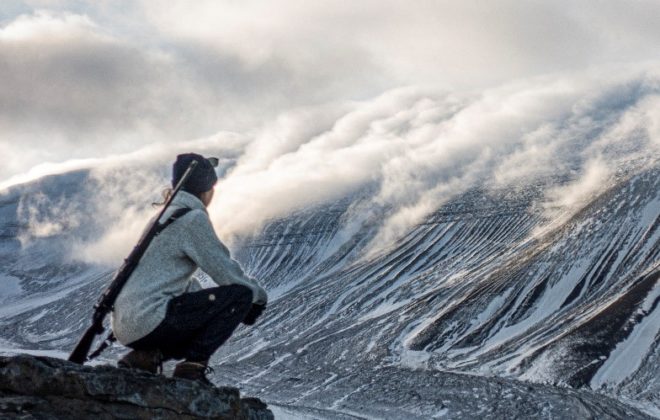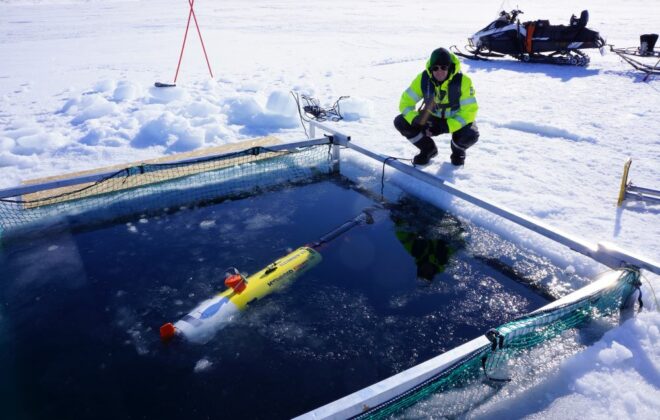PhD life in the time of Corona
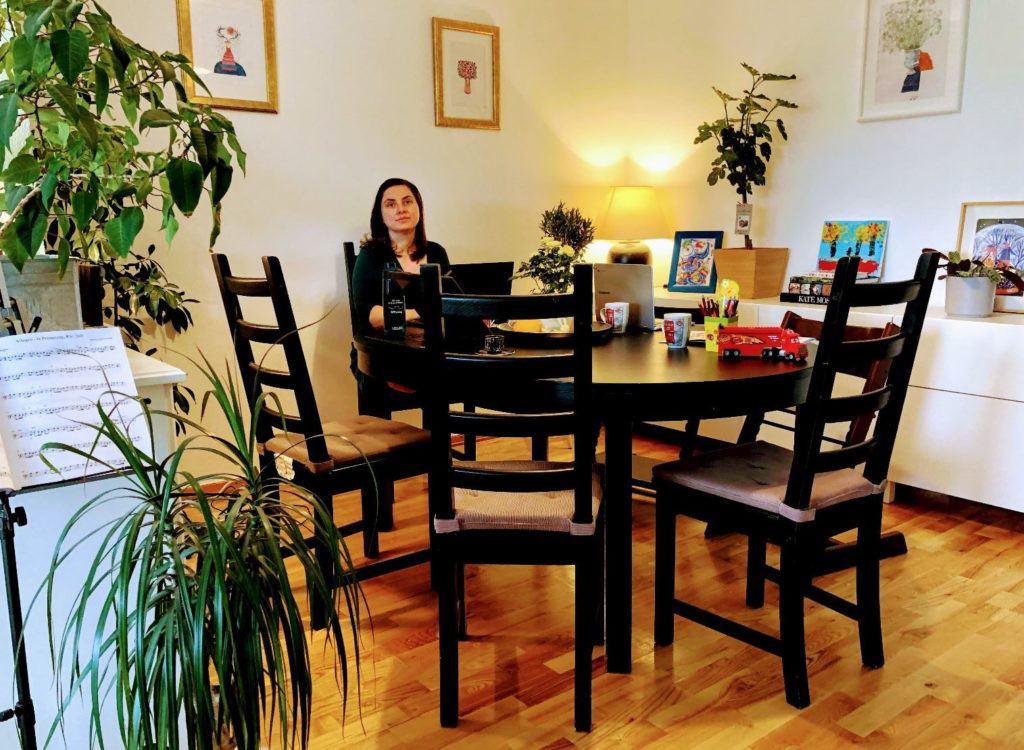
How is it to be a PhD student at NTNU during the corona situation? Cristina Maria Iordan describes her new work days from home, since the university campus closed.
Who am I?
My name is Cristina Maria Iordan and I am originally from Bucharest, Romania, but I have been calling Trondheim “home” for the past 10 years. I started my PhD at the Industrial Ecology Programme (IndEcol) at NTNU in August 2017 after previously graduating in June 2016 from the International Master Programme in Industrial Ecology. In between I have worked for 1 year as a Research Assistant in the same department.
I am a bit of a social person who loves music, dancing, discovering new places and great foods and finds real pleasure in reading.
What do I do?
I am working in Professor Francesco Cherubini’s group at the Industrial Ecology Programme (IndEcol), in the Department of Energy and Process Engineering (EPT). In my work I try to better include in the Life Cycle Assessment (LCA) framework climate impacts from bio-resource extraction and use, especially those following land use or land cover changes. My thesis addresses the interactions between climate forcing agents and individual climate system responses, with a focus on the land-climate nexus.
My office space these days is basically the living room table. The place is very cozy, but I have to share it with the other three in my family who are using it as a working space as well. Currently this place is hosting 3 to 4 laptops at a time, a couple of colouring and reading books, tons of pencils and some Legos (those are everywhere in my “new office»). And at mealtimes this space also magically transforms into the dining table as well.

Usually I drink two intense double espressos a day. I am a bit of a coffee fanatic, so if I don’t have good coffee around, I might not drink at all 😊.
A timeline description of a not-so-typical-anymore day in my life
Since social distancing and the work from home period started, my routines have been completely turned upside down. Usually, in pre-corona times, we were out of the house for most of the day: at work, school or kindergarten and afterwards engaged in different activities with the children or our friends. These days however we are both adults working and caring for our two children entirely from home. One is in primary school and the other in kindergarten.
8:00
Now I wake up around 8:00, which is extremely late considering that previously I would have been already done with my morning training session and at work by this time. The day starts now with a pretty relaxed first hour dedicated to preparing and eating breakfast and a round of facetime calls with our parents, grandparents and siblings. This morning greeting session became a routine after the social distancing and isolation started in all the countries where we have family residing.
9:00
At 9:00 (after a very short commuting time from the kitchen to the living room) we start the office hours. I do not have teaching duties this semester, so my time goes entirely to my research. Well, in theory. My work is 100% computer based, without lab work, so I don’t suffer any interruptions due to the closing of the NTNU campus. Well, again, this is theory. For most of my work routine now I run scripts, read journal articles or write my current paper. Usually the mornings are focused time, so dedicated entirely to progress with my current research.
12:00
Around 12:00 we all four start preparing lunch – we have an agreement during this period: everybody in the house helps with preparing the meals. Usually, this was the moment of the day when at IndEcol we would have gathered in our lovely lunch area and eat all together our matpakke while debating on different topics and projects. And I do miss a lot my colleagues, the interaction and the vibrant social environment at IndEcol. On the other hand, I can’t complain too much now either. At lunch time, we all four prepare more elaborated dishes than the usual sandwiches (everybody is free to chip in with exotic and never-tried-before dish suggestions), and the discussions are for the most part dominated by the fascinating world of superheroes, Minecraft and not to forget the infinite world of Lego designs. And I have to admit that my 3 new working colleagues are super nice as well. 😊
After lunch is the only time of the day when we watch the news on TV – namely, Supernytt (which for the non-parents here are the news for children on NRK, the national Norwegian TV channel). I watch the 15 minute show together with my kids in order to be able to discuss what was presented afterwards and to try my best to answer their questions. Forget how difficult it is to explain some unbounded infeasibilities in your code … try explaining to a 5 year old that you don’t know when exactly his life is going to go back to (what we are now referring to as) “normal life”.
13:00 – each day in the week with a different schedule
Most of my meetings are after lunch time, so after 13:00 I usually meet my colleagues with whom I collaborate on projects, my supervisor for some weekly guidance and the master student I am co-supervising this year. Monday is my day without any meetings, with full focus on progressing with my research – you know, just to have a strong start of the week.
Tuesday is the day when usually at IndEcol we have our weekly Lunch Seminars – this is a 15 minute meeting during lunch when by rotation one of us is presenting his/her latest research so all of us get familiar with our colleagues’ work. Now we have this as a weekly Zoom meeting.
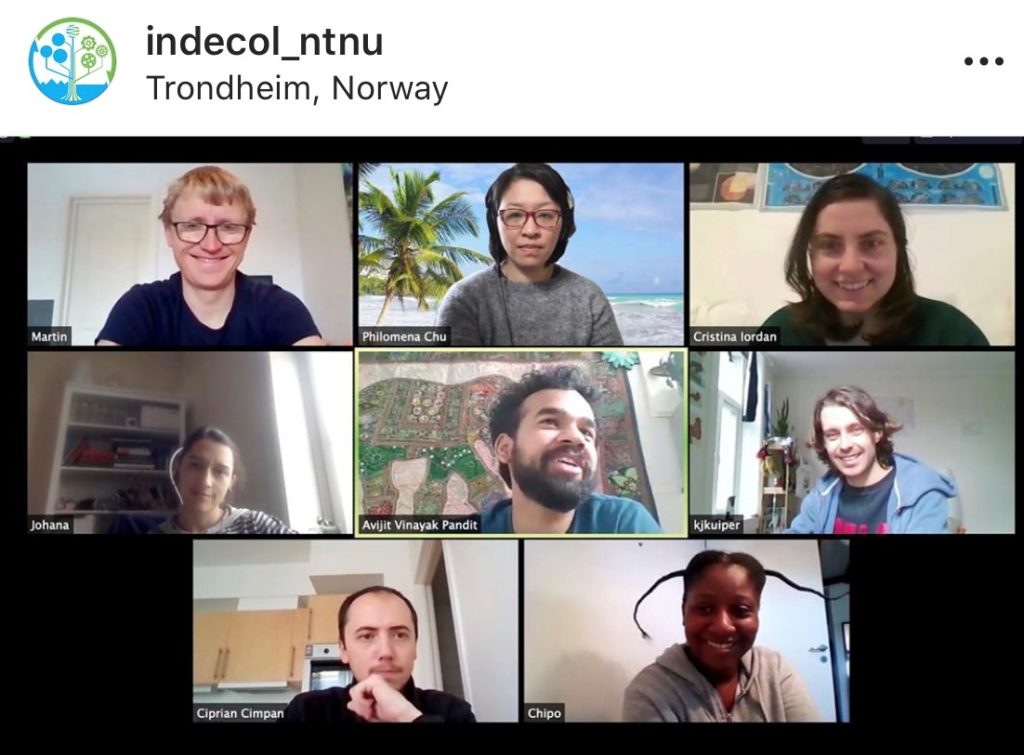
Wednesdays on campus were usually the “kanelboller” day, so together with the other 3 PhDs in my group we were gathering downstairs at the SiT Café in Realfagbygget for a 15 minute coffee and cinnamon roll break. As you might guess, we moved this also online, on Zoom, just that now we all gather from our kitchens and eat whatever delicious or not-so-delicious comfort food we are able to bake on our own. Debatable these days is the gastronomic side of this event, but the spirit is preserved also under these challenging times: discussing about our current issues, trying to constructively help each other and offer encouragement.
Thursday is the day when I meet my supervisor and we discuss about my PhD work. These days however, in the first part of the meeting we discuss about how it goes with the working from home and the arising issues from this not business as usual situation. I feel quite lucky, as my PhD supervisor has been offering a lot of support and guidance also in this department and I feel comfortable in discussing honestly with him all the ups and downs of this new situation.
Friday is the day when at IndEcol we were having Cake Day – one of us, by rotation again, was baking a cake (chocolate was always the hinted ingredient to the newcomers and also the secretly and highly expected flavor by most of us). Again, maybe not anymore a surprise by now, we moved these meetings on Zoom as well. At least we spare some sugar intake during these already high in calories times due to intensive corona snacking.
17:00
At 17:00 I have my daily Pilates training – this is the moment of the day dedicated to the much longed-for stretching. Commuting time to the gym is also very short and not that problematic these days: moving from the far east side to the far west side of the living room. And you guessed right, the word is again online! I am training online together with a group of friends from the studio where I was going before. Gym equipment? I am “lucky” in this regard: I have enough equipment at home due to the daily recovery routine I must do after an injury at the beginning of last autumn.
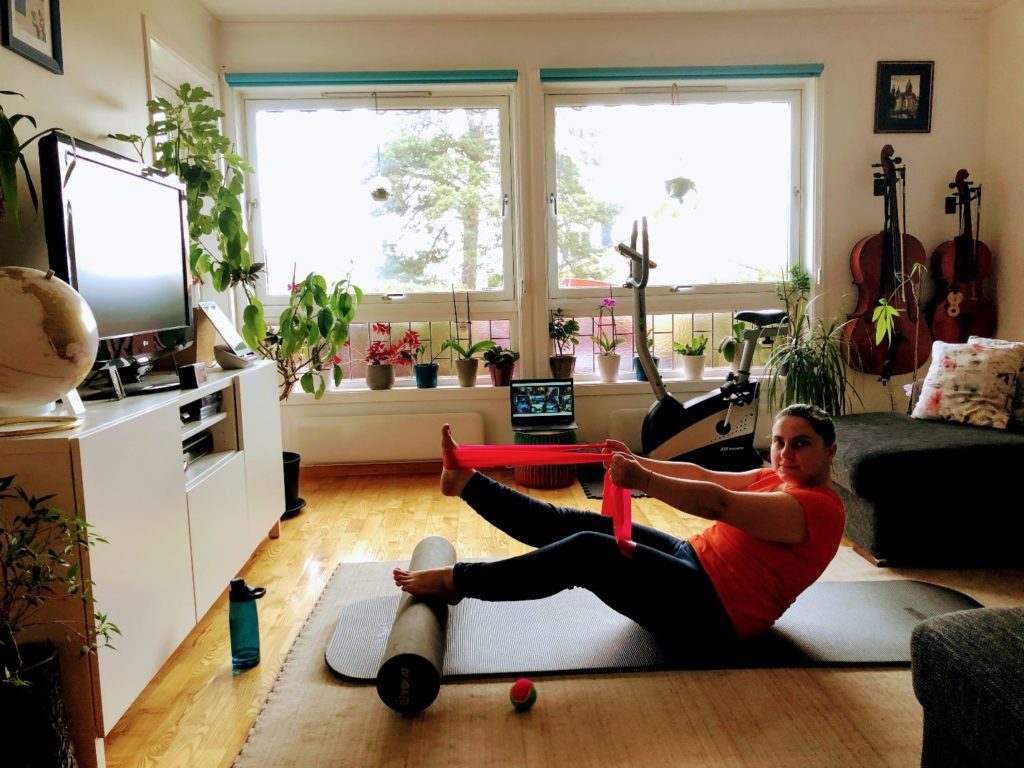
18:00
Around 18:00 we start to prepare dinner (again all four of us). While cooking dinner we also call all our close relatives to check their “adventures of the day” and to provide mutual encouragement. After dinner is the board game time of the day – as an agreement with the children, each day while in social distancing we all four play together a board game of their choice.
21:00
Around 21:00, after the kids are in bed, I sometimes turn to my computer for another 1-2 hours of work if I still have the energy and concentration. Other evenings I feel completely exhausted and I just listen to music or read (I am not a big TV fan). And then there are as well the weekly virtual dinner gatherings with friends which can only a bit compensate for the lost social contact.
23:30
My day usually ends around 23:30 with a book. I try to preserve my sleep routines as much as possible and keep a sense of normality.
Many aspects of my academic life have been adapted and transferred into remote and online versions. One of my IndEcol colleagues recently defended her PhD thesis online from Switzerland while her supervisor was here in Trondheim and the opponents were connecting from different spots around the globe. The current living and working situation clearly proved we have the flexibility to adapt to new and unforeseen situations, and I tried to find some routines and balance between all the new components of my life.
My new job description
In practice however, as a working from home and parent position, my job description changed slightly to accommodate the new tasks as: secretary, schoolteacher, kindergarten educator, technical support, online event planner and piano, violin and cello coach. Basically, all the activities the kids used to have every week have moved now online, except for the sport ones. And this is what impacted my job the most. Having to keep my two children engaged at home for all this time, unable to see and play with their friends while trying to find time and focus on my work. Flexibility and adaptability (together with Zoom, online and virtual) are the new rules of the day for my PhD life.
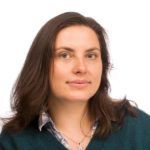
Cristina Maria Iordan
Cristina Maria Iordan is PhD Candidate at NTNU - Norwegian University of Science and Technology, Department of Energy and Process Engineering and the Industrial Ecology Programme.
Cristina Maria Iordan
Search
Søk
Categories
- Arctic Research
- Arkitektur
- Bærekraft
- Bioingeniørfag
- Biologi
- Biology
- Biomedical Laboratory Science
- Biotechnology
- Bioteknologi
- Chemical Engineering
- Chemistry
- Climate
- Computer Science
- Datateknologi
- Digital
- Elektronikk
- Energi
- Energi
- Energy
- Engineering
- Engineering
- Environment
- Food Science
- Forskning
- Fysikk
- Fysikk
- Havbruk
- Informasjonsteknologi
- Informasjonsteknologi
- Ingeniørvitenskap
- Kjemi
- Kjemisk prosessteknologi
- Kjemisk prosessteknologi
- Kreftbehandling
- Kybernetikk
- Marine Technology
- Materialer
- Materials Science
- Materialteknologi
- Matvitenskap
- Meninger
- Miljø
- Min ph.d.
- My PhD
- My PhD
- My postdoc
- Nanotechnology
- Nanoteknologi
- Ocean
- Oil and gas
- Physics
- Research
- Simulering og visualisering
- Spør en forsker
- Studentliv
- Sustainability
- Ukategorisert
- Universitetsliv
- University Life
Kategorier
- Arctic Research
- Arkitektur
- Bærekraft
- Bioingeniørfag
- Biologi
- Biology
- Biomedical Laboratory Science
- Biotechnology
- Bioteknologi
- Chemical Engineering
- Chemistry
- Climate
- Computer Science
- Datateknologi
- Digital
- Elektronikk
- Energi
- Energi
- Energy
- Engineering
- Engineering
- Environment
- Food Science
- Forskning
- Fysikk
- Fysikk
- Havbruk
- Informasjonsteknologi
- Informasjonsteknologi
- Ingeniørvitenskap
- Kjemi
- Kjemisk prosessteknologi
- Kjemisk prosessteknologi
- Kreftbehandling
- Kybernetikk
- Marine Technology
- Materialer
- Materials Science
- Materialteknologi
- Matvitenskap
- Meninger
- Miljø
- Min ph.d.
- My PhD
- My PhD
- My postdoc
- Nanotechnology
- Nanoteknologi
- Ocean
- Oil and gas
- Physics
- Research
- Simulering og visualisering
- Spør en forsker
- Studentliv
- Sustainability
- Ukategorisert
- Universitetsliv
- University Life

